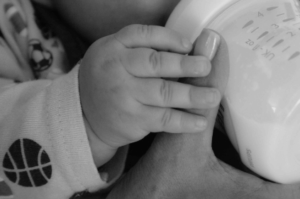Table of Contents
If you are a new mum, you know that breast pumps are a necessity and a majority of mothers use breast pumps. Good pumping means your body can produce more milk and help you keep up with the demands of breastfeeding your newborn.
But choosing the right pump can be difficult because so many options are available in the market. From manual pumps to electric breast pump types, these options have varying functions and advantages to fit the needs of any breastfeeding mum.
So how do you choose? Here are four basic breast pump types to help you start your research.

1. Manual Breast Pump
If you are a lactating mother, you may consider using a manual breast pump to express your milk. Manual breast pumps are an option for those who want to save money or do not need to pump very often. While these pumps are not as effective as electric models, you can use them effectively in certain situations.
The manual breast pump creates suction that resembles how babies latch, pulling the milk out of the breast and placing it into a container where you can store it. While this process may seem simple, it can be hard to get into a regular pumping rhythm, making it slower than electric pumps.
This pump is ideal for on-the-go mums looking for portable yet reliable devices because it is lightweight and has simple and functional components that are easy to sterilise.
2. Battery-Operated Breast Pump
The battery-operated breast pump is an electric breast pump that is powered by batteries rather than plugged into an electric outlet. This means you can use it anywhere, as long as you have access to a battery or two, and just stash it in your purse for easy transportability.
This type of breast pump is a great option for mums who do not want to deal with the hassle of manually-pumping milk but prefers portability. Additionally, it is quieter than electric pumps, so it would not cause disturbance to your baby or the people around.
Although battery-operated pumps are ideal for portability, they can quickly run out of power and have lesser suction power than electric pumps.
3. Electric Breast Pump
An electric breast pump is an excellent option for mothers looking for a more convenient option than a manual breast pump. It is one of the most powerful pumping options available, so it is worth looking into if you want a faster, more efficient way of pumping.
This pumping device typically features adjustable speed and suction strength, which allows you to customise which works best. Electric pumps will enable you to express milk from both breasts simultaneously, which means less pumping time.
Electric breast pumps may be efficient, but it also has their downsides. For instance, it can make much noise compared to manual breast pumps due to the machine running, which can cause disturbance to the baby. This device is too big to bring along if you are going on a trip, but you still need to express milk.
4. Hospital-Grade Breast Pump
Lactation consultants and hospitals recommend hospital-grade pumps for mothers who are required to produce a milk supply if a prolonged separation is necessary for certain situations like the baby being in the NICU – neonatal intensive care unit. This type of pump is also ideal for mothers experiencing mastitis, an inflammation of the breast, or feeding difficulties.

This type of pump has a wide range of settings and capabilities, making them perfect for mothers who need something powerful enough with their pumping routine. Hospital-grade breast pumps are designed for multi-use rentals to assist mothers in expressing their milk.
Compared to an electric breast pump, a hospital-grade breast pump offers stronger suction and strength, making expressing milk easier and more efficient for lactating mothers.
How to choose the right breast pump for you?
Breast pumps are a wonderful tool for nursing mothers—they can help with soreness and engorgement and provide a way to express milk that you could store for later use.
Before choosing which breast pump to purchase, it is important to assess your situation. You can use manual or battery-operated pumps if you prefer portability and do not need extra suctioning strength.
But if you require more suctioning strength and ease of use, you can choose electric breast pumps available on the market. Renting a hospital-grade pump is an option for you if certain conditions require the industrial strength of this kind of pump.
Also Read This: Common Health Conditions That Affect Almost Everyone
Conclusion
There are many factors to consider when deciding which type of breast pump to purchase. Whether it’s an electric or a manual pump, there are choices for every kind of mum.
Make sure to reach out to your lactation consultant to make a more informed decision about the type of pump that will best suit your needs.















